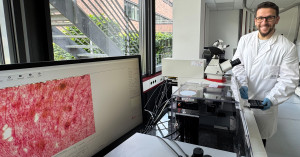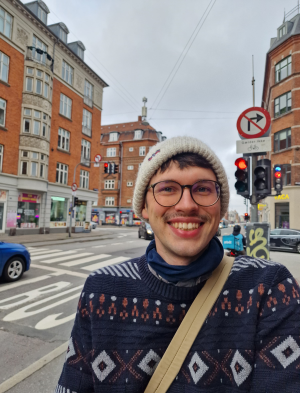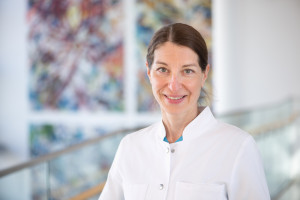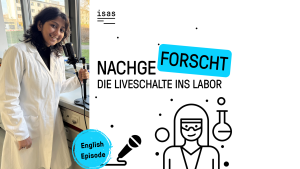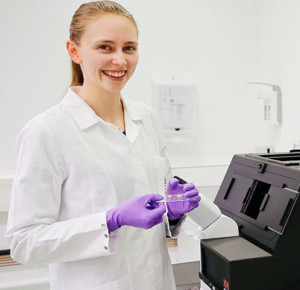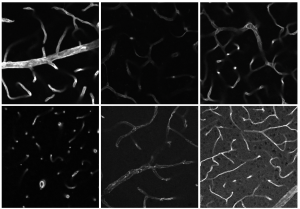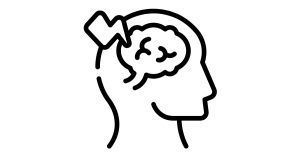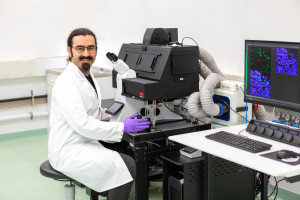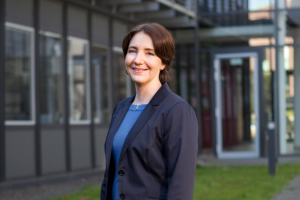Dortmund, 8th September 2025
Susmita Ghosh, a doctoral student in the Biofluorescence Research Group, is one of three lead authors of a study published in the Journal of Neuroinflammation. Together with Ali Ata Tuz (ISAS and Universitätsklinikum Essen and Laura Karsch (Universitätsklinikum Essen), she investigated the connection between gut microbiota and neutrophil granulocytes. In this interview, the biologist discusses her research on proteins and the effect that neutrophils have on the brain following a stroke.
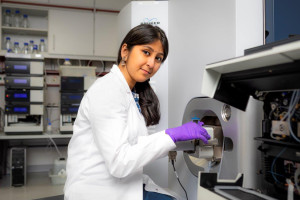
Susmita Ghosh analyses samples of neutrophil granulocytes using an ultrasensitive mass spectrometer. Her aim is to understand how immune cells behave after a stroke.
© ISAS / Hannes Woidich
1. How did you come up with the link between gut microbiota, neutrophile activation and strokes?
Ghosh: In our previous papers, we observed that activated neutrophils have a negative impact on stroke outcomes. We wanted to find out why and identify the decisive factors. Meanwhile, Dr Vikramjeet Singh from University Hospital Essen was researching the link between gut microbiota and stroke outcomes. Together, we wanted to establish whether gut microbiota could trigger neutrophil activation upon stroke. To do this, Ali Tuz, Laura Karsch and I divided the parts of the study equally. While Ali and Laura brought in their expertise with imaging and flow cytometry techniques, I was responsible for the proteomic analyses using liquid chromatography-mass spectrometry (LC-MS). Since the neutrophils’ behaviour depends on their protein expression, we chose proteomic analysis to understand the neutrophiles’ behaviour after a stroke. From the brain of mice with stroke, we got only a handful of neutrophils, which is difficult for proteome analyses. Since I had already optimised the proteomics approach for low input samples in a previous study, it was easy to apply this method to investigate the gut microbiota’s influence on neutrophils.
2. What exactly did your results reveal about gut microbiota and neutrophile activation?
Ghosh: I analysed the proteome of neutrophils isolated from the brains and blood of mice that had experienced a stroke. Using label-free quantitative proteomics, I identified the changes in protein expression between neutrophils upon microbiota depletion compared to the control sample in which microbiota was present. This enabled us to infer that neutrophils from mice with depleted microbiota were less activated and provided greater support for tissue repair in the brain following a stroke. This finding indicates that gut microbes positively influence neutrophil activation after stroke, causing more and worsening existing inflammation. We were able to validate my results with those from other experiments, using ELISA (Enzyme-linked Immunosorbent Assay). This was important to us, as validating proteomic data is difficult and often missing in research papers.
Article Recommendation
Tuz, A. A., Ghosh, S., Karsch, L., Antler, M., Lakovic, V., Lohmann, S., Lehmann, A. H., Beer, A., Nagel, D., Jung, M., Hörenbaum, N., Kaygusuz, V., Qefalia, A., Alshaar, B., Amookazemi, N., Bolsega, S., Basic, M., Siveke, J. T., Heiles, S., Grüneboom, A., Lueong, S., Herz, J., Sickmann, A., Hagemann, N., Hasenberg, A., Hermann, D. M., Gunzer, M., Singh, V.
(2025) Gut microbiota deficiency reduces neutrophil activation and is protective after ischemic stroke. Journal of Neuroinflammation, 22, Nr. 137.
3. How do your findings about the gut microbiota contribute to our understanding of its role after stroke, and what are the next steps in this line of research?
Ghosh: The gut microbiota is essential for our day-to-day life. However, our results suggest that healthy microbiota can have a negative influence on stroke outcomes due to activated neutrophils. But we still do not know how this microbiota-neutrophil-interaction occurs. If we manage to identify any factor that activates the neutrophils, we could try to inhibit it to reduce tissue damage. However, we also do not yet know if our findings apply to human gut microbiota. This is an exciting area of research with many questions still to be answered.
(The interview was conducted by Anna Becker.)
